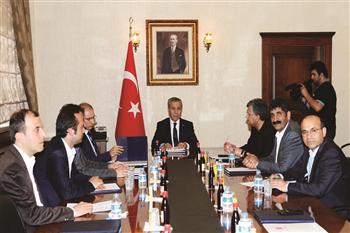Talks for a solution on the future of Taksim Gezi Park begin in Ankara between representatives of NGOs and Deputy Premier Bülent Arınç, with all eyes fixed on the return of PM Erdoğan from a North African tour.
 As Prime Minister Recep Tayyip Erdoğan returns from a series of official visits abroad, all are waiting to see whether he will assume a milder tone concerning the ongoing unrest all over the country. In the meantime, Deputy Prime Minister Bülent Arınç has been in charge in a bid to reduce the tension.
As Prime Minister Recep Tayyip Erdoğan returns from a series of official visits abroad, all are waiting to see whether he will assume a milder tone concerning the ongoing unrest all over the country. In the meantime, Deputy Prime Minister Bülent Arınç has been in charge in a bid to reduce the tension.
As had been announced on June 4, when he held a meeting with President Abdullah Gül, Arınç hosted June 5 members of the Taksim Platform, who had objected to the Taksim Square Pedestrianization Project from the beginning.
The group conveyed their demands to Arınç: Gezi Park should remain a park with no construction within, this decision should be officially announced and the Atatürk Culture Center should not be demolished; law enforcement officers and bureaucrats who led to rising violence that resulted in the killings of three citizens and wounding of thousands should be investigated and removed from office – in particular the governors and police chiefs of Istanbul, Ankara and Hatay – use of tear gas and similar materials should be banned; all protesters in custody should be immediately and unconditionally released; it should be announced that none of those protesters will be prosecuted; and all de facto obstacles and bans against use of the freedom of assembly in all squares and public zones of Turkey – particularly Taksim Square and Kızılay Square, which are the venue for May 1 gatherings – as well as barriers to freedom of expression should be removed.
During the meeting, which took place upon the deputy prime minister’s invitation, Arınç maintained the stance he displayed during a press conference on June 4, thus he once more affirmed that the initial protests were righteous. Yet, he once again avoided offering a clear apology, sources present at the meeting told the Hürriyet Daily News.
When Arınç suggested that it was now time to end the protests, the platform members responded by saying that they were not authorized to make such a call, the same sources said, speaking on condition of anonymity.
“Even if we say so, these protests will not end. We came here as their spokesperson. We did not start the process, neither can we end it,” they stated.
The platform has further voiced the need for “binding promises” from the government for the protests to close. As an answer to that, Arınç guaranteed that the government would discuss the matter.
“At the moment, the operation in Gezi Park has stopped. We will handle the subject extensively at the Cabinet meeting upon Mr. Prime Minister’s return. We will discuss [it] as the government. We will re-evaluate there at the Cabinet meeting. Like I said, at the moment, the operation has stopped and we will discuss and debate the matter with our prime minister, the mayor, all sides, and by running the process like this, we will come to a conclusion,” Arınç replied.
Not only about Gezi
A statement read out by the Taksim Platform following the meeting with Arınç made clear that the content of the rising reaction against the government should not be limited to objections to plans to build a replica of Ottoman-era barracks where Gezi Park is located.
Particularly through the third bridge over the Bosphorus plan, the third Istanbul airport plan, the Canal Istanbul project, plans for the Atatürk Forest Farm (AOÇ) and hydroelectric power plants (HESs), the government has been “attacking the people’s ecological values,” the platform said.
While assessing the unrest in the country, the government should be well aware of “the stance against the war policy for our country and the demands for peace, the sensitivity of our Alevi citizens, the rightful demands of victims of urban transformation, the voices rising against conservative male politicians controlling women’s bodies, the resistance against the requirements on universities, judiciary and artists, the demands vis-à-vis seizure of rights of all the working class including Turkish Airlines (THY) workers, the struggle against all sexual orientation and gender identity discrimination, and requests for removal of obstacles to citizens’ access to education and health services,” it said.













